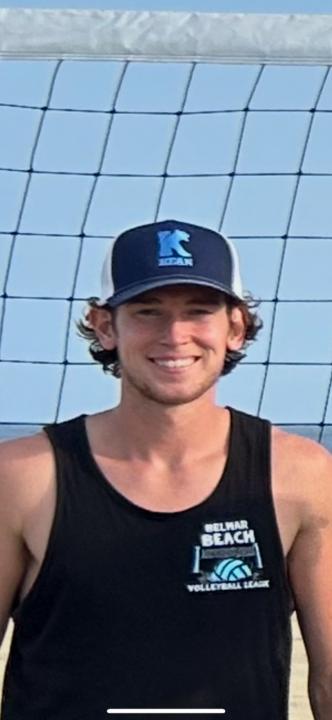Activity
Mon
Wed
Fri
Sun
Jan
Feb
Mar
Apr
May
Jun
Jul
Aug
Sep
Oct
Nov
Dec
What is this?
Less
More
Owned by Caleb
The Beach Volleyball Campus is for anyone looking to get better at beach volleyball. We answer any volleyball questions you have!
Memberships
8 contributions to Beach Volleyball Campus
1 like • Oct 15
@Brian Rushalski Agility on the sand all comes down to footwork. The more efficient you are with your footwork, the easier everything will be. A common mistake is taking a bunch of tiny, choppy steps to get to the ball which wastes time. The key is only take a few, large steps to get to the ball. Not only will this get you to the ball quicker, but you will also have less fatigue afterwards because you are actually doing less! Next time you are at the beach practice shuffling laterally in every direction. Take big shuffle steps, and try to keep the amount of time your feet are contacting the ground to a minimal. Next do a few short sprints of 10-15 yards. Do those things consistently and you will be flying through the sand in no time!
0 likes • Oct 15
@Brian Rushalski the key to being effective in the wind is to reduce the influence of the wind has on the ball. The easiest way to do this is to keep your passes and sets lower. The lower you keep the ball the less time the wind has to move it around. A common mistake is people play the same exact way when it’s windy as they would when it’s not windy. In reality wind is a huge element of the game and you need to adjust your play style accordingly. Next time you have a game when it’s windy try communicating with your teammates before hand to keep the passes and sets lower. Hope this works for you!
What is the greatest feeling in volleyball?
These are all great, but which is the best?
Poll
3 members have voted
Coaching Tournaments
Hi! As a coach what are your top tournament essentials or advice? Thanks!
0 likes • Sep 1
Best advice I can give for tournaments is to start preparing early. I find that I do my best when I physically and mentally prepare the days leading up to competition. I like to get a couple practice days in before the tournament, and then make sure I have at least one day of rest the day before. The day before I try my best to drink plenty of water, stretch, and get a massage. I also try to play out my game plans in my head all throughout the week. I find that mentally picturing positive outcomes has helped my performance the day of. As for the tournament day itself, it’s critical for me that I stay mentally engaged throughout the entire tournament. Sometimes this can be challenging due to long periods of time between sets where you are waiting and not playing. It can be really easy to lose focus and forget the ultimate goal of the day. For me doing frequent warm ups, and paying attention to the other games has helped me stay focused. It’s also a great chance to talk strategy with your partner! Hope this helped answer your question. Good luck at your next tournament!
Brand New to Beach Volleyball
I have never played beach volleyball before, and the only experience I've had with indoor volleyball was during gym class in middle/high school. I know that it's broad to ask for tips on where to start, but I'm nervous about getting out there. Thank you!
2 likes • Aug 27
It is awesome that you are looking to get out and play! No need to be nervous we all have to start somewhere. What I would suggest is joining a local beach league for 6on6. This is where I started playing and it was great because nobody else knew what they were doing either so we all learned together. Luckily most beach leagues have division for complete beginners. The Belmar Beach Volleyball League is a great example. I would also recommend joining a clinic for adults at a beach near you. This way you are getting proper instruction about the fundamentals which you can apply and focus on at your next league night. Even better if you can get some of your teammates to sign up too. Biggest thing for complete beginners is just going out and playing. Get used to the sand, and the wind and just have fun. If I could go back to when I first started, I would focus on one skill each time I played instead of trying to get everything down all at once. Definitely get out there and play, it is such a great sport to get into. It is a perfect time to start because so many people are just starting out just like you and there are always ways to play no matter what your skill level is!
Volleyball Conditioning
Have not played in awhile and looking to get back in beach volleyball shape. I know nothing beats actually playing for conditioning but are there any drills you suggest conditioning wise? Something that I can do on my own for the times I do not have other people to play against.
2 likes • Aug 27
Good question! Beach volleyball is a game that rewards quick bursts of power. So, if I haven't played in a while I focus on primarily building that endurance and strength in my fast twitch muscle fibers. The drills below can all be done anywhere but obviously if you can get out on the sand and do them there it will be even better. It is also a good idea to stretch, and foam roll before these workouts. Drill 1 (Sprint progression)- Place two cones about 20 yards away from each other. If you don't have cones, you can eyeball it. Start behind one cone. 1. Do a 50 percent jog from one cone to the other, then walk back (3 reps) 2. Same thing now 75 percent (3 reps) 3. Move your cone closer so now it is 10 yards away. Now go 100 percent sprint and run through the other cone. (30 second rest between each set. Go for 5 sets) Drill 2 (Shuffling): Set your cones about 15 yards apart and shuffle back and forth between them. Start slow and eventually progress until you are going as hard as you can. Focus on driving hard off you opposite foot. So if you are shuffling left your focus should be explosively pushing off that right foot. Drill 3 (plyometrics): 1. Pogo jumps- Start by standing with your arms at your side. You will do a total of three jumps. The first two are small hops, and the last is a powerful max jump. Your emphasis should be minimizing the amount of time your feet are on the ground and swinging your arms as far back as possible as you go into your third jump. Go for 3 sets of 8 reps. Each 3 jumps count as one rep. 2. Squat jumps: For this you have the option of doing it with or without added weight. Slowly lower yourself into a squatting position. Once you reach the bottom of the motion quickly explode out of it with a jump. Do 3 sets of 8.
1-8 of 8
@caleb-whitehead-1399
Beach volleyball enthusiast. I want to help you win more leagues, and tournaments!
Active 41d ago
Joined Aug 18, 2025




